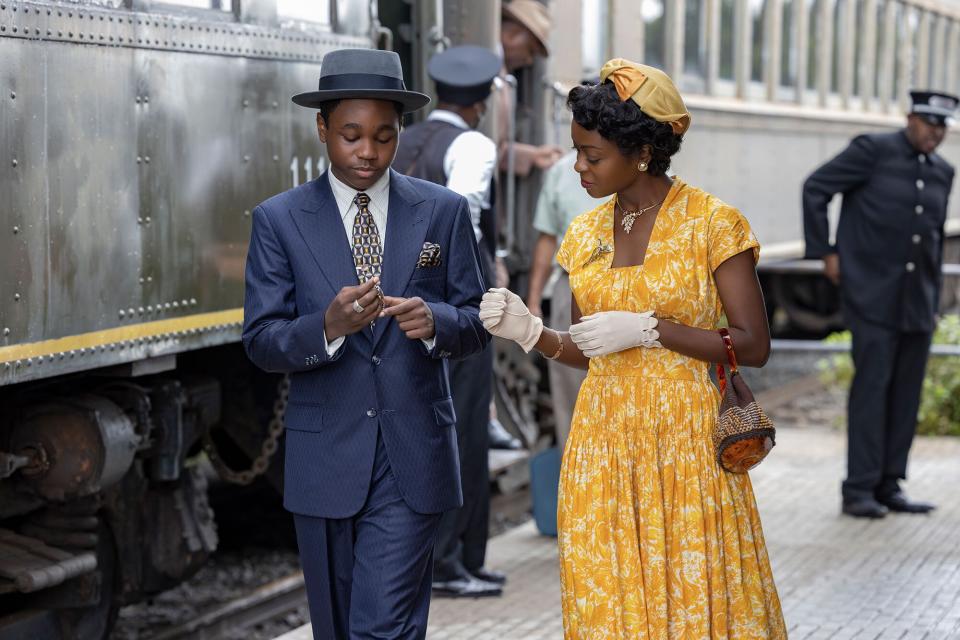Till review: A notorious civil-rights story, recast through a mother's eyes
- Oops!Something went wrong.Please try again later.
- Oops!Something went wrong.Please try again later.
- Oops!Something went wrong.Please try again later.
Time has a way of sanding down the details of personal history, turning messy truths into neatly polished myth. Late this summer, though, it brought home an ugly reminder of the old adage that the past is neither dead nor even past when a grand jury in Mississippi declined to indict Carolyn Bryant, now in her late eighties and seemingly unrepentant, or at least not particularly interested in redemption, for her role in the 1955 lynching of Emmett Till.
It was Bryant's accusation of impropriety — of a young Black boy in the Jim Crow South daring to speak familiarly to a white woman at all, really — that ended in his kidnapping, torture, and murder. Till's death, and the complete lack of consequences imposed on those responsible for it, became a critical flashpoint in the civil rights movement; his story has been recounted in numerous mediums since then, and refracted for decades through the work of artists ranging from William Faulkner to Bob Dylan. Till, in theaters Oct. 14, comes at it from a unique if more oblique angle, centering Emmett's mother Mamie Till-Mobley (Danielle Deadwyler) and her valiant, often lonely struggle to find any form of justice and accountability for her son.

Lynsey Weatherspoon / Orion Pictures
The result is a film made with unwavering empathy, and embodied with singular grace and ferocity by Deadwyler (Station Eleven, Watchmen), if also one that feels more impactful as an acting showcase and a diligently pitched history lesson than as a fully formed drama on the screen. Writer-director Chinonye Chukwu (Clemency), who cowrote the script with Michael Riley and Keith Beachamp, has made the deliberate choice to swerve from any explicit recreation of the actual event, confining her narrative mostly to the foreboding before and the pained aftermath. Instead, she paints a sweet but incomplete portrait — Till was only 14 when his life was cut short, could it really be any other way? — of a dimpled Chicago boy (Jalyn Hall) and the family who adores him: his widowed mom, Mamie; her own mother (an affecting but underused Whoopi Goldberg); and the kindly fiancé (Sean Patrick Thomas) she's set to marry.
Beset with a slight stammer but the bright spark of a born performer, Emmett is a cheeky, exuberant charmer who loves to sing along to commercial jingles on TV and patiently endures Mamie's repeated anxious instructions as he prepares to visit his cousins in Mississippi: Be quiet, be respectful, make yourself small. ("They have a different set of rules for Negroes down there.") He's too young, though, and maybe too naive, not to bring his city-kid swagger into the small grocery store where a then-21-year-old Carolyn (Cyrano's Haley Bennett) stood behind the counter. Till takes what may be some contentious liberties with the details of what happened next (whether he really wolf-whistled at Bryant, or even spent time alone with her in the store, has been the subject of much dispute in historical record). But it ends the same: with Emmett abducted in the night by a group of local men, and not seen again until his mutilated body was pulled from the Tallahatchie River.
Chukwu makes Mamie the audience's painful proxy for all that, imbuing the events leading up to it with a jittery, almost dreamlike dread. The production and costume design impeccably evoke the signifiers of midcentury style, from the cowboy wallpaper in Emmett's bedroom to Mamie's pressed hair and carefully matched jewelry sets, and the soundtrack pulses with jaunty pop songs and harrowing orchestral swells.
What's missing, maybe, in the almost faultlessly respectful script, is a more genuine and textured sense of who the Tills were beyond their defining tragedy. Deadwyler, an actress mostly known until now for standout supporting turns in larger ensembles like The Harder They Fall, brings a haunted immediacy to Mamie even when the screenplay doesn't rise to meet her, grief and fury and fierce dignity passing across her face in annihilating waves. Till-Mobley's choice to let the world see what Mississippi had done to her son — she famously demanded an open casket at his funeral — helped ignite a movement, and made history. Till bears stirring witness to that, even if it leaves the full measure of her life a mystery. Grade: B
Related content:

